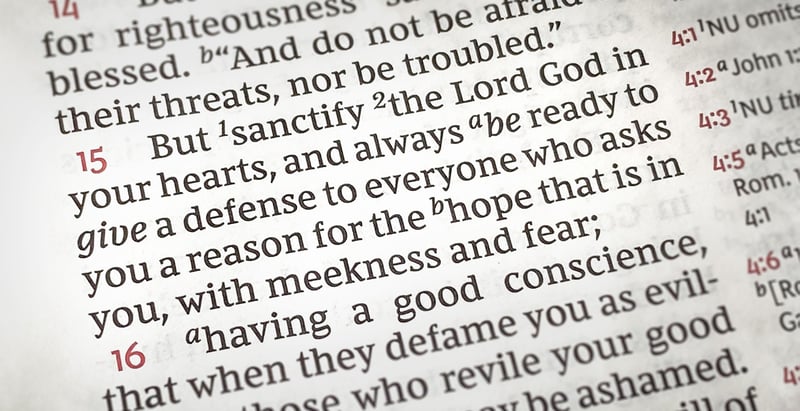What Is the Meaning of 1 Peter 3:15? Always Be Ready to Give a Defense?
In 1 Peter 3:15 Peter admonishes Christians to “always be ready to give a defense” of the hope in them. What does this mean? How can you do this?

What does 1 Peter 3:15 say?
“But sanctify the Lord God in your hearts, and always be ready to give a defense to everyone who asks you a reason for the hope that is in you, with meekness and fear”
In his book, Peter makes the point that as Christ suffered unjustly, so His followers might have to suffer—enduring persecution even for doing what is right and good. Peter also warned against the natural tendency to repay evil for evil while being mistreated (1 Peter 3:9-14, 16-18).
In the midst of his exhortation, Peter wrote, “But sanctify the Lord God in your hearts, and always be ready to give a defense to everyone who asks you a reason for the hope that is in you, with meekness and fear” (verse 15).
What did he mean by that? What does it mean to “give a defense”? How can we do it “with meekness and fear”?
Let’s take a deeper look at 1 Peter 3:15.
“But sanctify the Lord God in your hearts”
Peter begins with “But,” a conjunction that joins the thought in this verse with the previous verses. In verses 13 and 14, Peter discussed the issue of persecution. In verse 15, he is telling us that instead of retaliating against evil, a Christian must focus on sanctifying God in his or her heart.
But what does that mean?
God’s Word sets us apart, or sanctifies us, because it reveals a way of life that is diametrically opposed to the standards of those who live in the world around us.
The word sanctify means to set apart or separate something from what is common and dedicate it to God for a special purpose. Synonyms for sanctify include, consecrate, hallow, set apart, separate and declare holy.
Jesus said His followers would be sanctified by God’s truth—which is revealed in His Word (John 17:17). God’s Word sets us apart, or sanctifies us, because it reveals a way of life that is diametrically opposed to the standards of those who live in the world around us.
To “sanctify the Lord God in your hearts” means to make Him the focus of your thoughts—to put God first in your life. This means internalizing God’s Word so that we live by every word of it (Matthew 4:4).
Consider the opposite of sanctifying God in your heart by looking at an example from earlier in Peter’s life. When Jesus began to teach that He would die in Jerusalem, Peter’s first reaction was to rebuke Jesus. Jesus identified the source of Peter’s thoughts as being Satan and told Peter, “You are not mindful of the things of God, but the things of men” (Matthew 16:23).
To sanctify God in your heart is to have your mind filled with the things of God. By the time he wrote this letter, Peter had grown by leaps and bounds in having God’s Word deeply internalized.
A challenge for every Christian is to continuously internalize God’s Word into our minds, or to “sanctify the Lord God in [our] hearts.”
To learn more, read “Sanctify Them by Your Truth.”
“And always be ready”
The admonition to be ready or prepared is common in the Scriptures. Many of these admonitions are in the context of being prepared for the Kingdom of God to come. Consider the following examples:
- In the parable of the 10 virgins, five virgins were foolish because they were not prepared with extra oil, which symbolizes God’s Spirit (Matthew 25:3, 8).
- The Bride of Christ, the Church, will make herself ready for His return (Revelation 19:7).
- A Christian must always be ready and prepared for Christ to return (Matthew 24:44).
- As the ants prepare food for the winter, so we must also plan and prepare for the future, both physically and spiritually (Proverbs 6:6-8).
A true Christian should always be ready. Why? Because he or she should always be doing God’s will (Matthew 7:21), always praying (1 Thessalonians 5:17) and always studying His Word (2 Timothy 2:15). By doing so, a Christian is building his or her relationship with God and seeking to enter His Kingdom (Matthew 6:33).
Jesus said, “Blessed is that servant” whom He will find “so doing” when He comes (Matthew 24:46).
Vigilant readiness is a major theme of the Bible.
To learn more, read “Diligence in the Bible.”
“To give a defense to everyone who asks you a reason”
Peter then went on to tell what a Christian must be ready to do in this context.
Christians must be ready to give a defense, or an answer, for their hope—for why they believe what they believe. Why would Christians be asked to give a defense of their faith? Because a Christian’s behavior and example should stand out as different. When we live God’s way of life, our example will shine like a light in this dark world (Matthew 5:16).

Notable leaders in the New Testament were called to give a defense of their belief. Examples include Stephen, when he was questioned by the high priest (Acts 7:1), and Paul and Silas, when they were asked by the jailor, “Sirs, what must I do to be saved?” (Acts 16:30-32).
No situation is the same, and a Christian can’t specifically prepare for every possible scenario.
But what we can do is thoroughly know our Bible. A Christian must constantly be studying God’s Word (2 Timothy 2:15), growing in faith and knowledge, living a moral life, exercising self-control, and showing kindness and love for others (2 Peter 1:5-7).
By regularly and faithfully doing all those things, a Christian should be well prepared to “give a defense.”
However, we must remember that giving a defense doesn’t mean getting into arguments about Bible issues or debating about doubtful things. Christians are warned not to argue or quarrel (Proverbs 26:4; Titus 3:9; 2 Timothy 2:23).
To learn more, read “Be Ready Always to Give an Answer.”
“For the hope that is in you”
When is hope most needed? When one is suffering through a trial.
The apostle Paul and his friend Silas were excellent examples of this. After being beaten, they were thrown into prison and bound in chains. Yet, despite their dire circumstances and the suffering they experienced, they prayed and sang praises to God. This didn’t go unnoticed by their fellow prisoners (Acts 16:23-25). It was their hope in God’s promises of deliverance and salvation that allowed them to keep a positive attitude through this terrible ordeal.
Giving a defense should always be done with an attitude of “meekness and fear.” The opposite would be arguing with a spirit of haughtiness and disrespect.
David suffered many years from King Saul’s attempts to hunt him down and kill him. In his psalms, David often praised God for the hope of salvation in the midst of anguish and despair. An example is Psalm 13, where he pleaded with God four times, “How long . . . ?” (verses 1-2). He was at a low point in his life. Yet, in the midst of his despair, he praised God for His mercy, salvation and abundant blessings (verses 5-6).
Hope is very powerful.
Our ultimate hope is in the coming Kingdom of God (Romans 8:24-25). Is there a greater hope than this? It is for this hope that Paul suffered greatly (2 Corinthians 11:23-28). He considered his physical sufferings as nothing compared to the hope of the future God has in store for us (Romans 8:18).
To learn more about the importance and power of hope, read “Our Future Hope.”
“With meekness and fear”
Giving a defense for your hope and beliefs should always be done with an attitude of “meekness and fear.” The opposite would be arguing with a spirit of haughtiness and disrespect.
Meekness is often mistaken as a weakness, but it is actually a strength because it takes immense self-control to be meek. Those who are meek have a teachable spirit.
Fear means reverence and respect. Christians should always share their hope in a spirit of respect and concern. They shouldn’t lecture others with a spirit of superiority and contempt for the other person.
True Christians understand that only God can call someone to Himself (John 6:44). A person can have an understanding of God’s Word and the hope of the Kingdom of God only when God intervenes in his or her mind.
That is why Christians should never try to push their beliefs down other people’s throats. Instead, they should interact with others as they would want to be treated (Matthew 7:12).
To learn more about this important principle, read “The Golden Rule in the Bible.”
Being set apart
God is setting apart a special people for Himself, to be a nation in His future Kingdom (1 Peter 2:9). Though God initiates the sanctification process, 1 Peter 3:15 shows that we have a part to play in the process. Peter said we are to “sanctify the Lord God in [our] hearts.” In other words, we are to make God the No. 1 priority and influence in our life.
Christians who truly internalize His truth and make the hope of God’s Kingdom their top priority (Matthew 6:33) will be prepared to give an answer, even in the midst of suffering and trials.
That is the meaning of 1 Peter 3:15.
Date Posted: February 22, 2023



